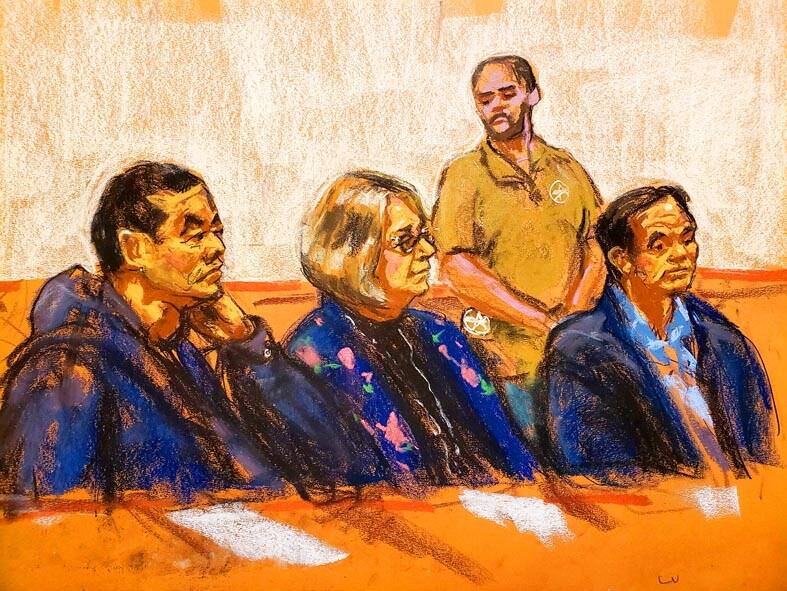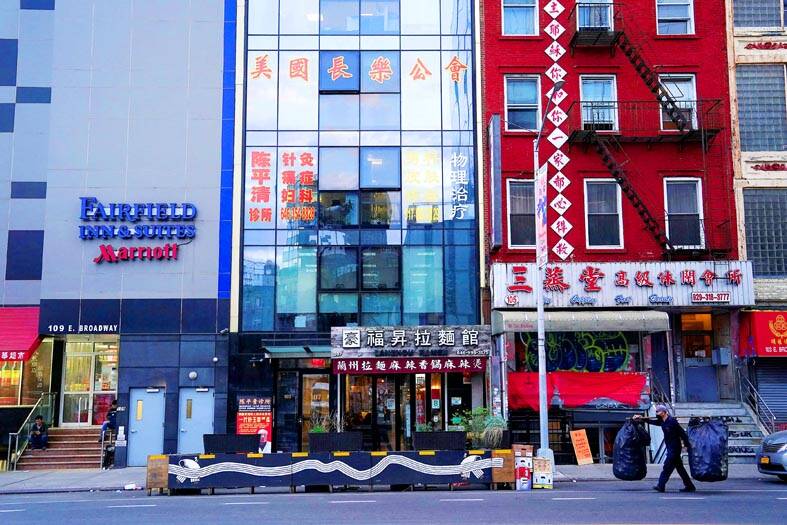Two men were arrested on Monday on charges that they helped establish a secret police station in New York City on behalf of the Chinese government, and about three dozen officers with China’s national police force were charged with using social media to harass dissidents inside the US, authorities said on Monday.
The cases, taken together, are part of a series of US Department of Justice prosecutions in recent years aimed at disrupting Chinese government efforts to locate in the US pro-democracy activists and others who are openly critical of Beijing’s policies and to suppress their speech.
One of three cases announced on Monday concerns a local branch of the Chinese Ministry of Public Security that had operated inside an office building in Manhattan’s Chinatown neighborhood before closing last fall amid an FBI investigation.

Photo: Reuters
The two men who were arrested were acting under the direction and control of a Chinese government official, and deleted communication with that official from their phones after learning of the FBI’s probe, the department said.
“This is a blatant violation of our national sovereignty,” Michael Driscoll, head of New York’s FBI field office, told a news conference.
The men, identified as “Harry” Lu Jianwang (盧建旺), 61, of the Bronx, and Chen Jinping (陳金平), 59, of Manhattan, both US citizens, were arrested at their homes on Monday morning.

Photo: Reuters
US Attorney Deirdre Vondornum, representing Lu, declined to comment. An e-mail message seeking comment was left with a lawyer for Chen.
Justice department officials in recent years have prioritized prosecutions of what is known as “transnational repression,” in which foreign governments work to identify, intimidate and silence dissidents in the US.
In a separate scheme announced on Monday, the department charged 34 officers in the Chinese Ministry of Public Security with creating and using fake social media accounts to harass dissidents abroad.
Prosecutors say the defendants also used social media to spread Chinese government propaganda and to try to recruit US citizens to act as Chinese agents. All of the defendants remain at large and are believed to be living in China.
In addition, prosecutors on Monday announced that eight Chinese government officials who are believed to be currently living in China were charged with directing an employee of a US telecommunications company to remove Chinese dissidents from the company’s platform.
Jin Xinjiang, a former China-based Zoom executive, was among 10 people charged in the scheme. He was first charged in December 2020, when authorities alleged that he tried to disrupt a series of Zoom meetings in May and June of that year that were meant to commemorate the 1989 Tiananmen Square Massacre.
At the time, Jin served as Zoom’s primary liaison with Chinese government law enforcement and intelligence services, regularly responding to requests by the Chinese government to terminate meetings and block users on Zoom’s video communications platform, authorities said.
In Beijing, Chinese Ministry of Foreign Affairs spokesman Wang Wenbin (汪文斌) said that China “firmly opposes the US smearing China and hyping up the so-called cross-border suppression plan.”
China does not operate stations for political purposes overseas, he added.

FREEDOM OF NAVIGATION: The UK would continue to reinforce ties with Taiwan ‘in a wide range of areas’ as a part of a ‘strong unofficial relationship,’ a paper said The UK plans to conduct more freedom of navigation operations in the Taiwan Strait and the South China Sea, British Secretary of State for Foreign, Commonwealth and Development Affairs David Lammy told the British House of Commons on Tuesday. British Member of Parliament Desmond Swayne said that the Royal Navy’s HMS Spey had passed through the Taiwan Strait “in pursuit of vital international freedom of navigation in the South China Sea.” Swayne asked Lammy whether he agreed that it was “proper and lawful” to do so, and if the UK would continue to carry out similar operations. Lammy replied “yes” to both questions. The

SECOND SPEECH: All political parties should work together to defend democracy, protect Taiwan and resist the CCP, despite their differences, the president said President William Lai (賴清德) yesterday discussed how pro-Taiwan and pro-Republic of China (ROC) groups can agree to maintain solidarity on the issue of protecting Taiwan and resisting the Chinese Communist Party (CCP). The talk, delivered last night at Taoyuan’s Hakka Youth Association, was the second in a series of 10 that Lai is scheduled to give across Taiwan. Citing Taiwanese democracy pioneer Chiang Wei-shui’s (蔣渭水) slogan that solidarity brings strength, Lai said it was a call for political parties to find consensus amid disagreements on behalf of bettering the nation. All political parties should work together to defend democracy, protect Taiwan and resist

By refusing to agree spending increases to appease US President Donald Trump, Spanish Prime Minister Pedro Sanchez threatened to derail a summit that NATO Secretary-General Mark Rutte needs to run smoothly for the sake of the military alliance’s future survival. Ahead of yesterday’s gathering in The Hague, Netherlands, things were going off the rails. European officials have expressed irritation at the spoiler role that Sanchez is playing when their No. 1 task is to line up behind a pledge to raise defense spending to 5 percent of GDP. Rutte needed to keep Spain in line while preventing others such as Slovakia

SHIFT PRIORITIES: The US should first help Taiwan respond to actions China is already taking, instead of focusing too heavily on deterring a large-scale invasion, an expert said US Air Force leaders on Thursday voiced concerns about the Chinese People’s Liberation Army’s (PLA) missile capabilities and its development of a “kill web,” and said that the US Department of Defense’s budget request for next year prioritizes bolstering defenses in the Indo-Pacific region due to the increasing threat posed by China. US experts said that a full-scale Chinese invasion of Taiwan is risky and unlikely, with Beijing more likely to pursue coercive tactics such as political warfare or blockades to achieve its goals. Senior air force and US Space Force leaders, including US Secretary of the Air Force Troy Meink and